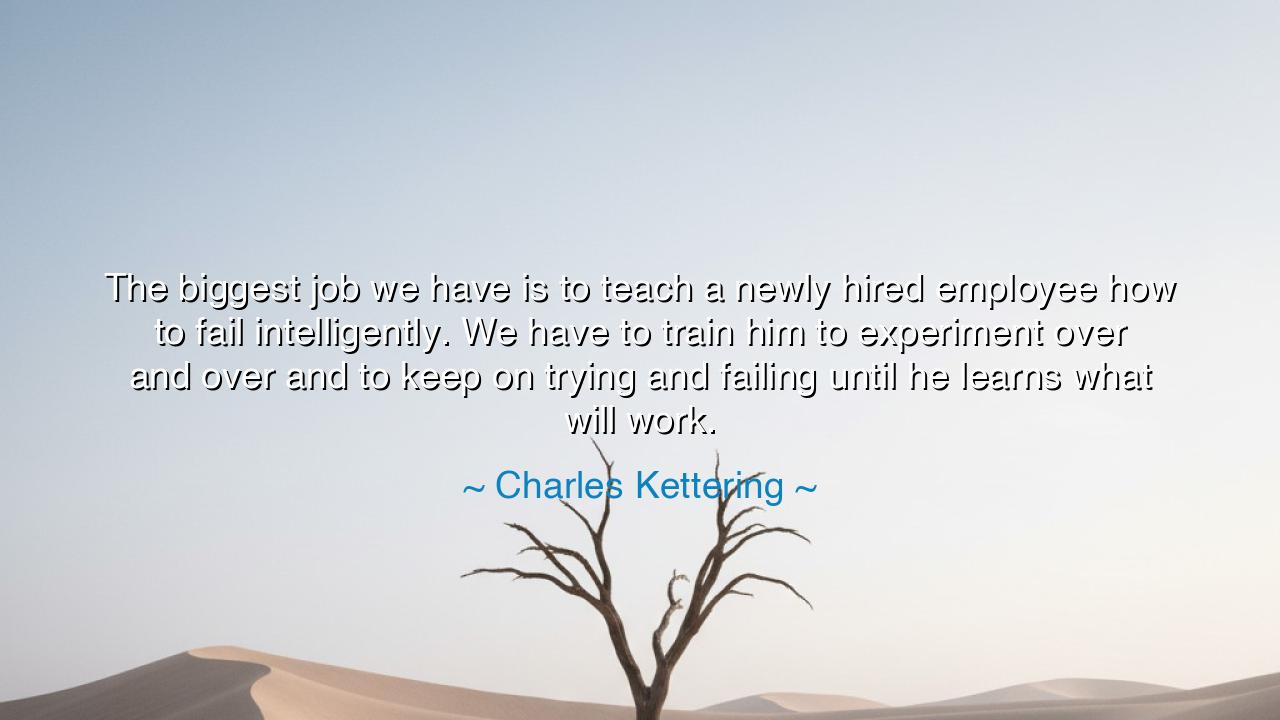
The biggest job we have is to teach a newly hired employee how
The biggest job we have is to teach a newly hired employee how to fail intelligently. We have to train him to experiment over and over and to keep on trying and failing until he learns what will work.






Hear the words of Charles Kettering, master of invention and pioneer of industry, who declared: “The biggest job we have is to teach a newly hired employee how to fail intelligently. We have to train him to experiment over and over and to keep on trying and failing until he learns what will work.” In this saying lies the eternal law of progress—that greatness is not born of perfection, but of failure embraced with wisdom.
To fail intelligently is not to stumble blindly, but to fall with eyes open, to draw knowledge from defeat as one draws water from the depths of a well. Failure, when honored as a teacher, reveals what cannot be done and points the way to what may yet succeed. The fool flees from failure; the wise apprentice welcomes it, for he knows it carries the seed of mastery.
Kettering, who lived among machines, engines, and endless trials, spoke from the crucible of innovation. He knew that every invention is forged not in triumph alone, but in the ashes of many abandoned attempts. To experiment over and over is the labor of the creator—the rhythm of trial and error that leads at last to discovery. Without the courage to endure failure, no light bulb would glow, no engine would run, no dream would take flight.
The newly hired employee, fresh in the field, must first unlearn the fear of imperfection. For schools may teach him to seek only right answers, but life demands that he risk wrong ones. The true training is not only in skill, but in spirit: to persist, to endure, to rise from each fall with renewed strength and sharpened insight. This is the foundation of all invention and the heart of all achievement.
Thus let this teaching be remembered: do not despise failure, for it is the crucible of greatness. To fail intelligently is to labor with courage, to wrestle with difficulty, and to transform error into wisdom. Kettering’s words stand as a beacon to every generation: that only through patience, endurance, and fearless experimentation does mankind ascend to new heights.






MNPham Thi Minh Ngoc
Kettering’s quote resonates with me because it shows that innovation often comes from trial and error. I wonder, though, how many companies truly support this type of learning environment. In some workplaces, failing can lead to penalties, rather than opportunities for growth. How can we shift the mindset from fearing failure to using it as a tool for improvement, especially in environments that value results over process?
0C05:Huong Chi
I find this quote refreshing because it acknowledges that failure isn’t something to hide from but to embrace. But how do you teach someone to fail intelligently? Is it enough to simply encourage experimentation, or do we need to provide structured guidance on how to reflect and learn from those failures? What role does feedback play in this process of intelligent failure?
NTMai Le Ngoc Tu
The concept of 'failing intelligently' is so important, especially in industries where innovation is key. Kettering’s quote suggests that failure is part of the process, but how do we create a culture where employees aren’t afraid to fail, especially in high-stakes environments? What steps can leaders take to normalize failure as a learning tool without allowing it to affect team morale or performance?
TMDuong Tuan Minh
Kettering’s insight makes me think about the value of persistence and resilience in the workplace. It’s easy to get discouraged when things don’t work out, but his approach encourages continuous experimentation. However, isn’t there a risk of employees feeling frustrated or demotivated? How can we ensure they stay motivated while learning from their failures, rather than becoming disheartened?
NLCAN NHAT LINH
This quote really challenges the traditional view of failure. Instead of seeing it as something negative, Kettering reframes it as a necessary part of success. I wonder, though, how do we balance allowing failure with the need for productivity and deadlines? Can organizations afford to let employees fail repeatedly, or is there a limit to how much ‘experimentation’ is acceptable in the workplace?